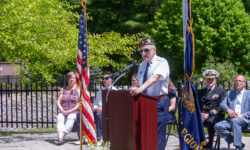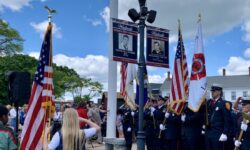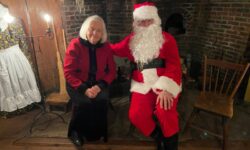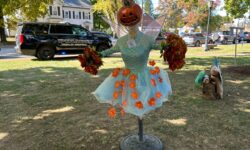[ccfic caption-text format="plaintext"]
This Memorial Day, Medfield will again assemble to honor those from this little town who went off to war and gave the ultimate sacrifice to their country. The parade will start behind Town Hall and march to Baxter Park with honor ceremonies, including an address by Navy veteran and Medfield High School class of 1988 graduate, Bart Garrison. They will march through Vine Lake Cemetery, including past the grave of Allen Alonzo Kingsbury, before ending on Peter Kristof Way.
It was 158 years ago on April 12 that Confederate guns opened fire on Major Robert Anderson and his men inside Fort Sumter, in the harbor of Charleston, South Carolina. The barrage went on for 34 hours before Anderson surrendered the fort; the Civil War, the bloodiest war in America’s history, had begun. The news reached Medfield late in the day, causing great excitement in the town. That excitement continued seven days later, when more news filtered into the town concerning the 6th Massachusetts being attacked on the streets of Baltimore while trying to get to Washington, D.C. In response to the attack on Fort Sumter, President Abraham Lincoln issued a call for 75,000 volunteers. Events began to happen fast. On May 11, Medfield Town Meeting voted $1,000 to properly outfit and equip all town volunteers.
Upon hearing President Lincoln’s request, 20-year-old Allen Alonzo Kingsbury left his family farm on South Street, said goodbye to his mother, Mary, his dad, James, his sister and brother, and walked to Chelsea to enlist. Allen enlisted as a private in the 1st Massachusetts Volunteer Infantry. From Boston they marched, took a boat, and then the train into Baltimore. From there, they continued on into Washington, D.C. In the journal he kept throughout the war, he records that he “went through the White House and got to see President Lincoln.” Kingsbury reports drilling and drilling at their camp, located just outside Washington, D.C. On July 18, 1861, they marched to the area near Manassas, Virginia. Kingsbury says of the marching: “We marched on, however, over some of the worst roads I ever saw - worse, if possible, than the road to the top of Noon Hill.” Here, Kingsbury and his troop encounter their first fighting. He records the following in his journal:
July 19:
Yesterday we had an awful fight in a swamp called "Bull Run.” Co.'s H and G were shockingly cut to pieces, about half of the two Co.'s were killed or wounded. I am wounded, a spent cannon ball struck me in the leg, and felled me to the ground. I was also wounded internally by having a wounded man fall on me. I am in the hospital at Centreville, there are twenty here, some are fatally wounded and some are shot through the arms, legs and feet. One man had his ear shot off by a cannon ball, one was shot through the abdomen, he cannot live. One had his leg taken off by a rifled cannon ball; one was struck by a cannon ball in the thigh, he cannot live. Six of our Co. are dead, six wounded and 11 missing.
In a letter written home to his parents, Kingsbury went into greater detail:
“…I saw a Confederate officer on the embankment beside a cannon; I brought my rifle to my shoulder and fired at him. He threw up his arms and fell headlong down the bank. A perfect volley of rifle shot then rained around me; one bullet struck me on the breast, went through my blanket and hit the eagle on my cross belt, and knocked me down. Another ball cut off my cap box. Our Captain then ordered a retreat, and we started for the open ground. The balls fell like hailstones around us, but I did not mind them; was as cool as ice. When I had got out of the woods and was walking along, a cannon ball struck the ground about a rod behind me, and rebounding, hit me in the joint of the knee, upon the underside, and knocked me down. I did not know where I was for several minutes. When I got up, I could not stand. Two of the N.Y. 69th took me up and carried me to the wagons. I did not think I was hurt much, but I found I could not walk, so I was carried to the hospital at Centreville.”
Kingsbury was hospitalized for a brief time before being released, to be sent home. After a return trip for recovery back to Medfield, he returned to action on September 11, 1861. In his journal, he writes: “Left home at 2 o'clock this afternoon for the depot on the Charles River Railroad, to take the cars for Boston, en route for the seat of war.”
After seven months of drilling, marching and fighting, Kingsbury was killed on April 26, 1862, in a charge on Confederate works near Yorktown, Virginia. Major General George McClellan, the Commander of the Army of the Potomac, describes the battle this way in a report to Secretary of War Edwin Stanton:
“Early this morning an assault upon the rebels was carried out by the First Massachusetts regiment. The Confederate Works had a ditch six feet deep and was manned by two companies of infantry; no artillery. Our men moved over open, soft ground some 600 yards; received the fire of the rebels at 50 yards; did not return it, but rushed over the ditch in the most gallant manner. The rebels broke and ran… Our loss, 3 killed and one mortally wounded and 12 otherwise wounded. Took 14 prisoners … Nothing could have been better than the conduct of all men under fire.”
The mortally wounded man was Allen Alonzo Kingsbury. He was shot in the body to the right of the umbilicus, according to the doctor who treated him. He died that night.
Kingsbury and the three others who were killed had funeral services in Chelsea on May 7, 1862. On May 9, the remains of Allen Kingsbury were brought back to his hometown with an impressive procession that was met at the town line by the Medfield Cornet Band and the Fire Company and given an escort to his home on South Street. Services were held in the First Parish Church. All businesses in town closed as everyone went to the service. More than half of the 1,000 people attending could not fit inside the church. Kingsbury was buried in Vine Lake Cemetery and his grave is marked to this day by one of the most impressive memorials in the cemetery. The book “The Hero of Medfield” was later published and contained Kingsbury’s war journal and letters written back to his family.
We remember Allen Alonzo Kingsbury and all veterans who gave their life for their country this Memorial Day.










